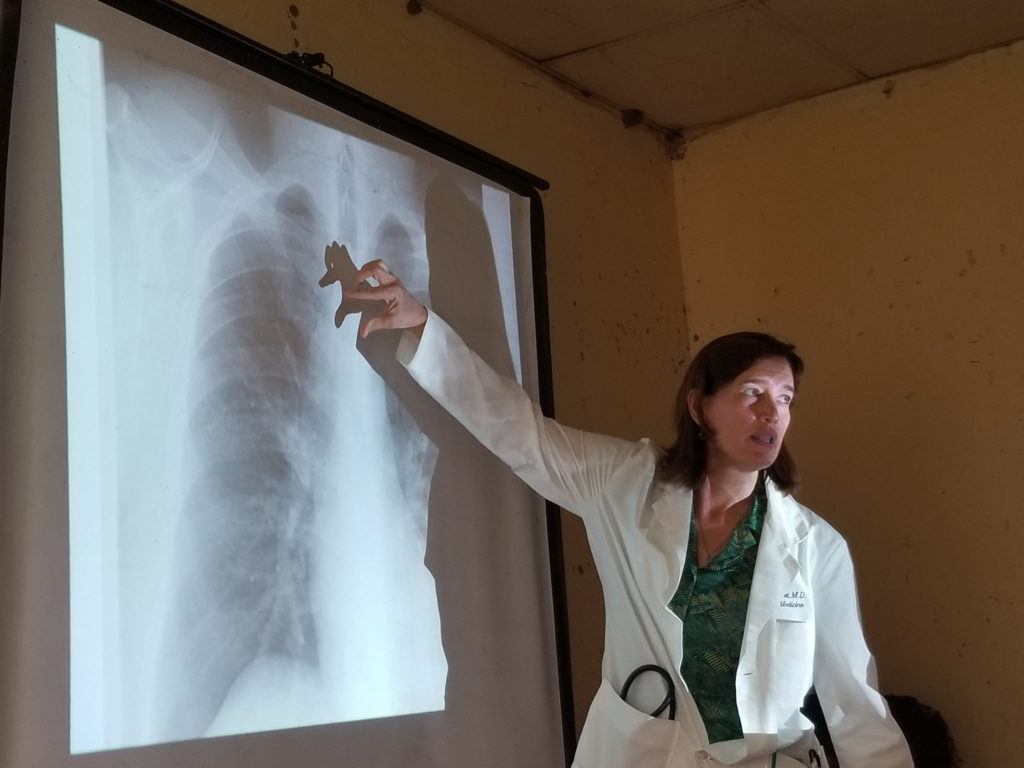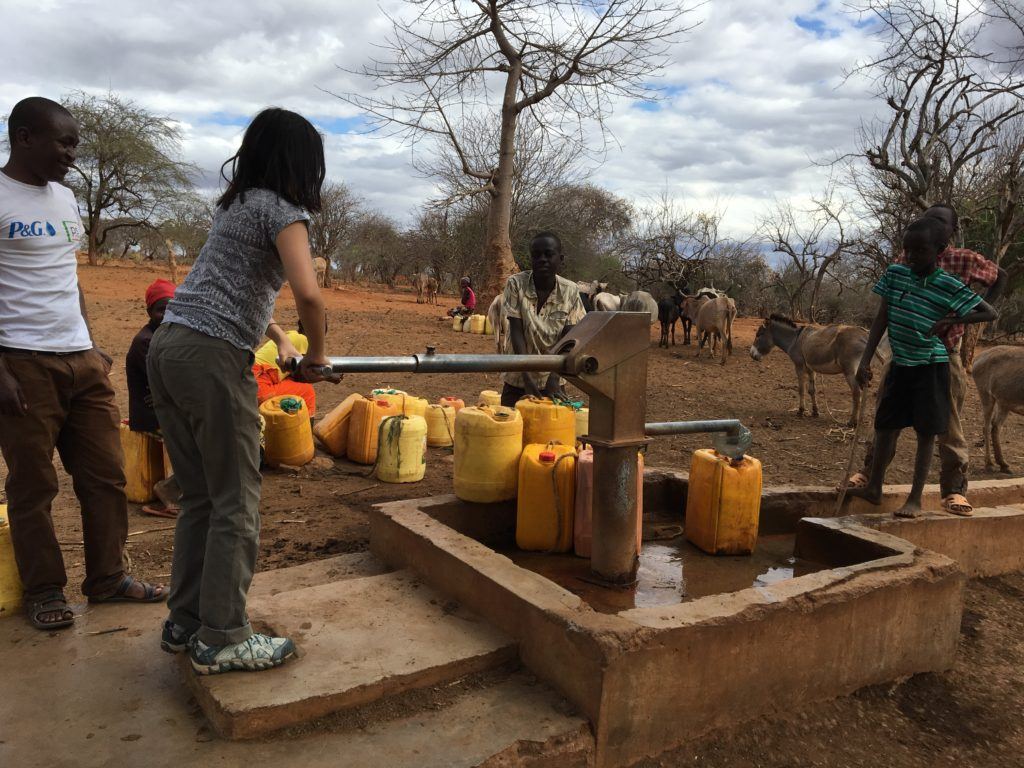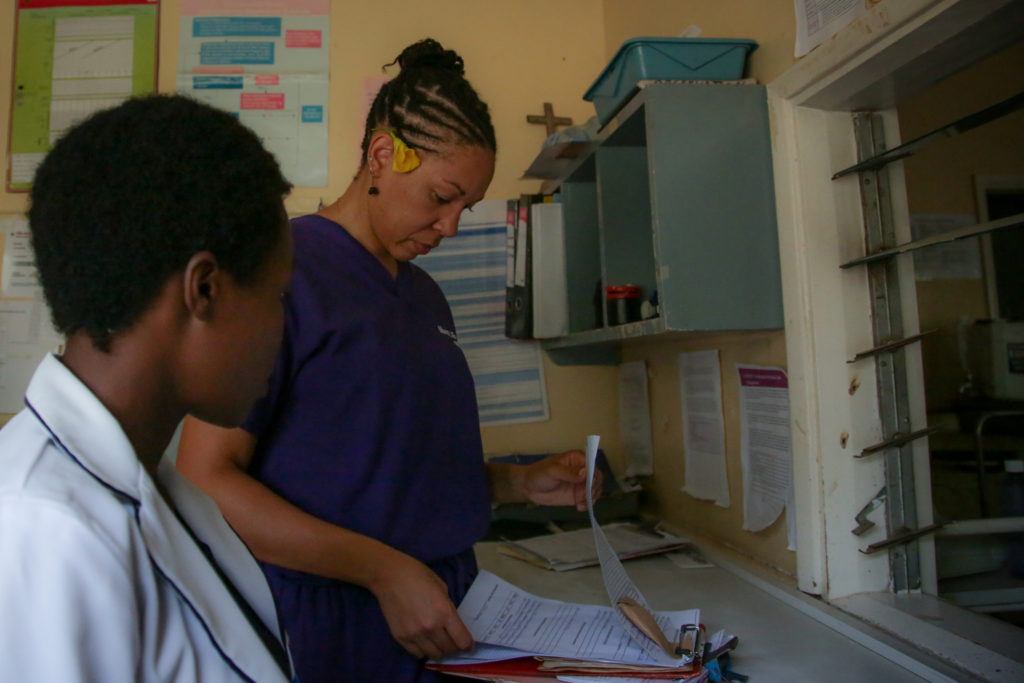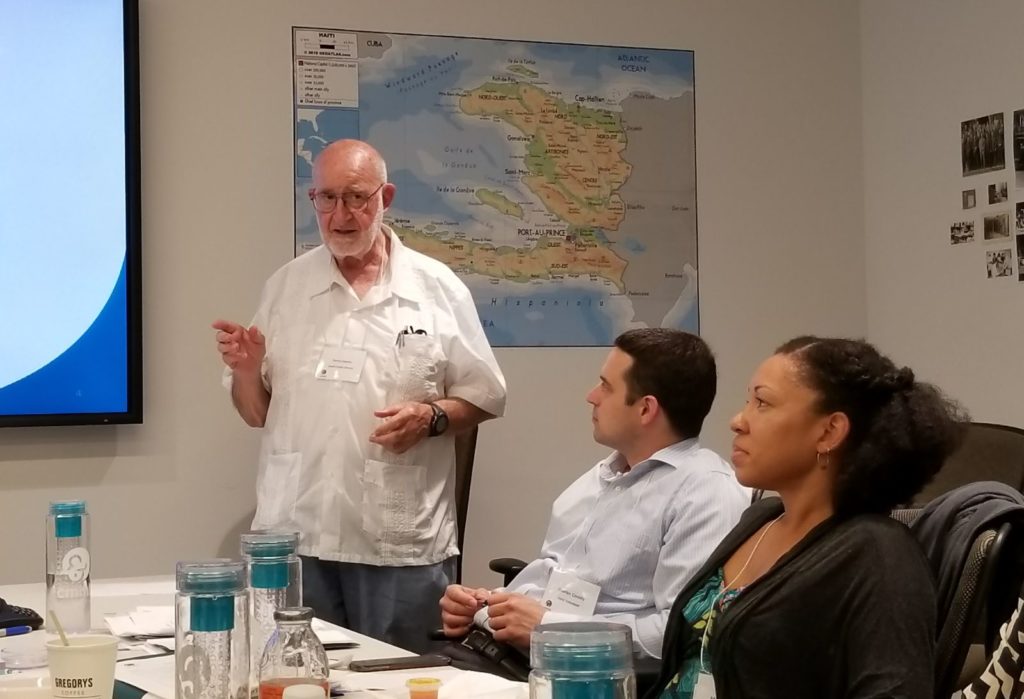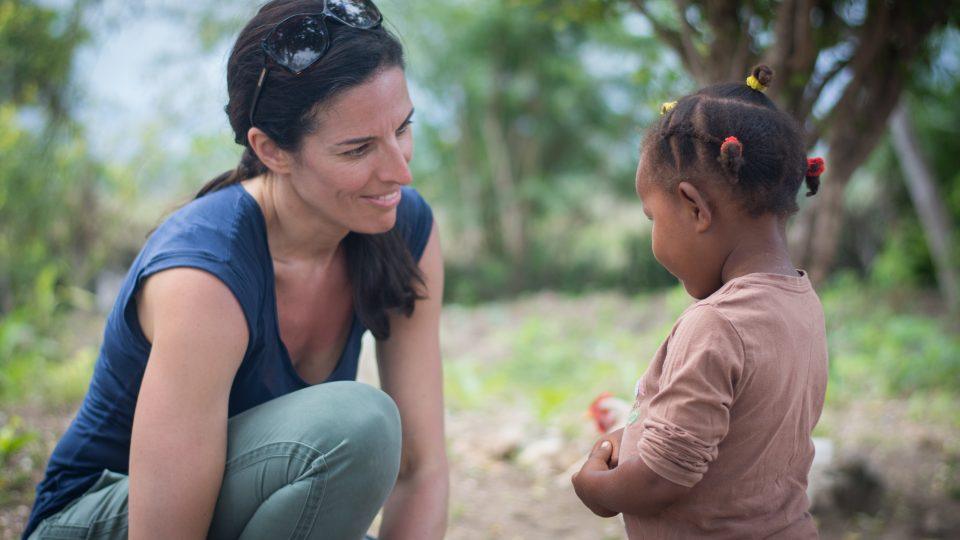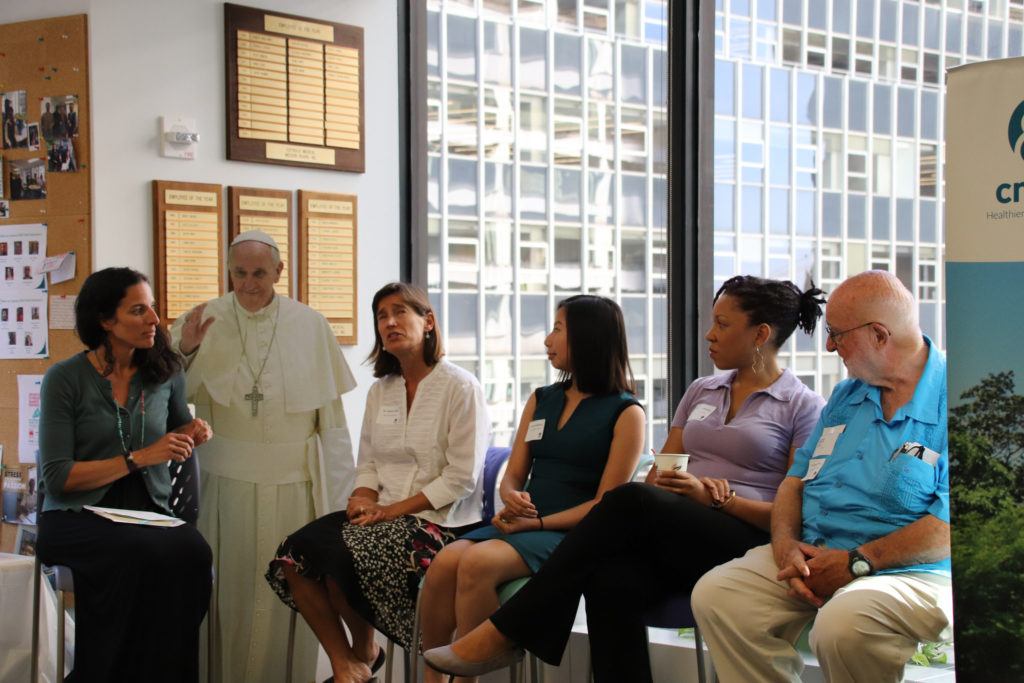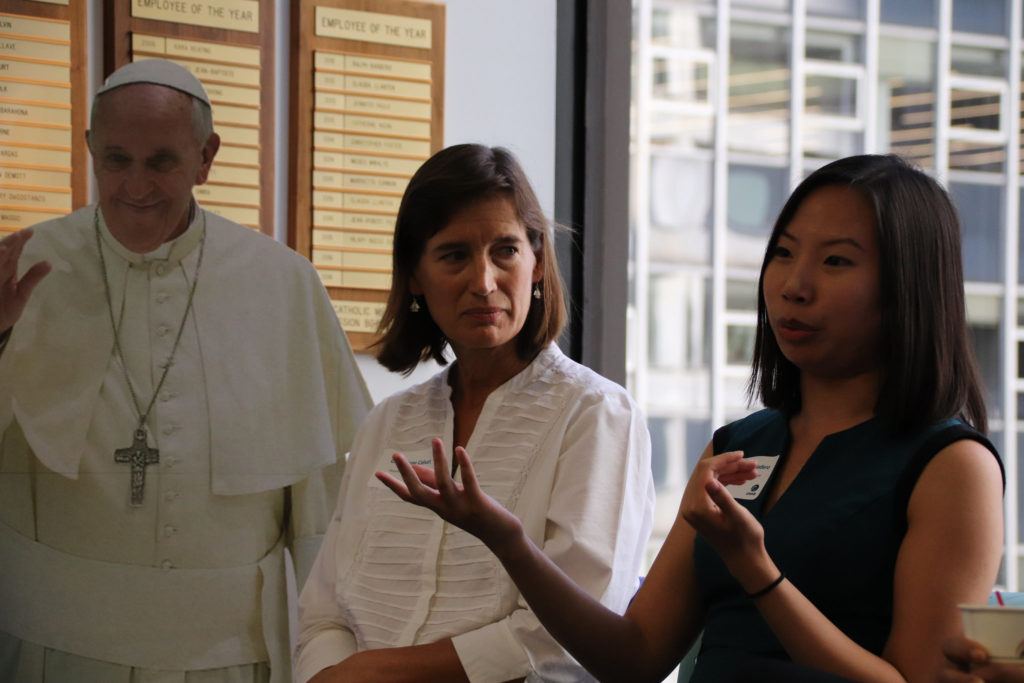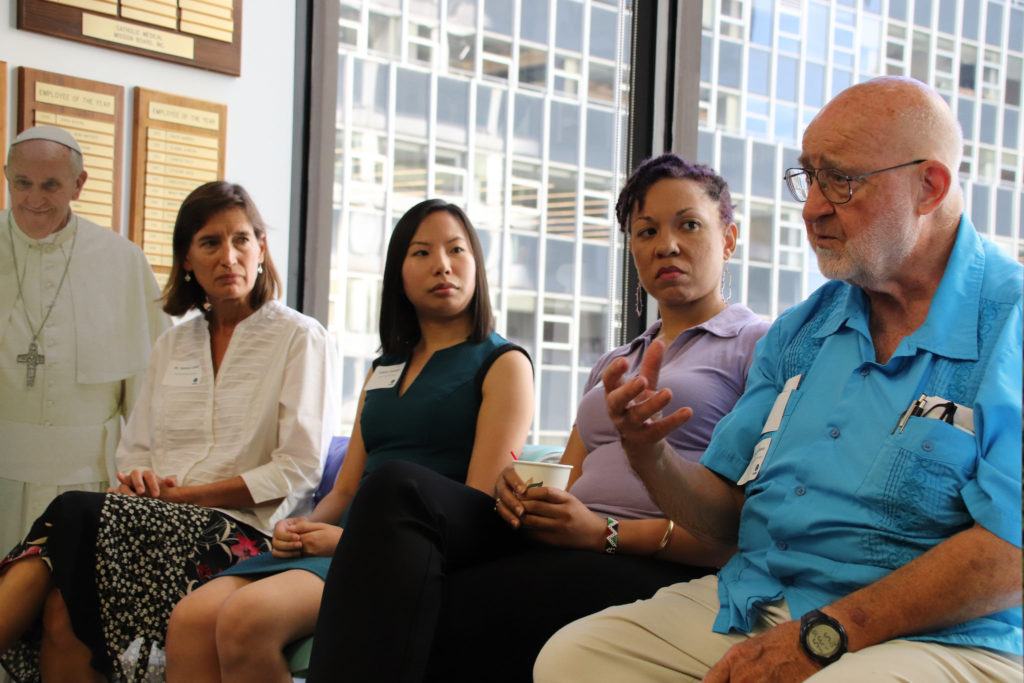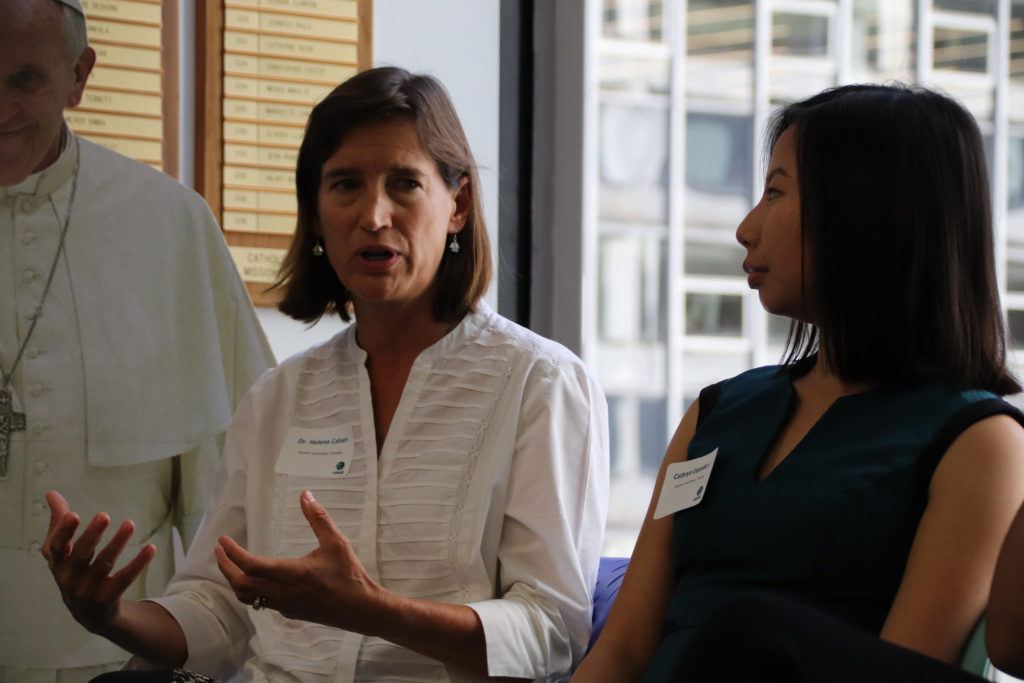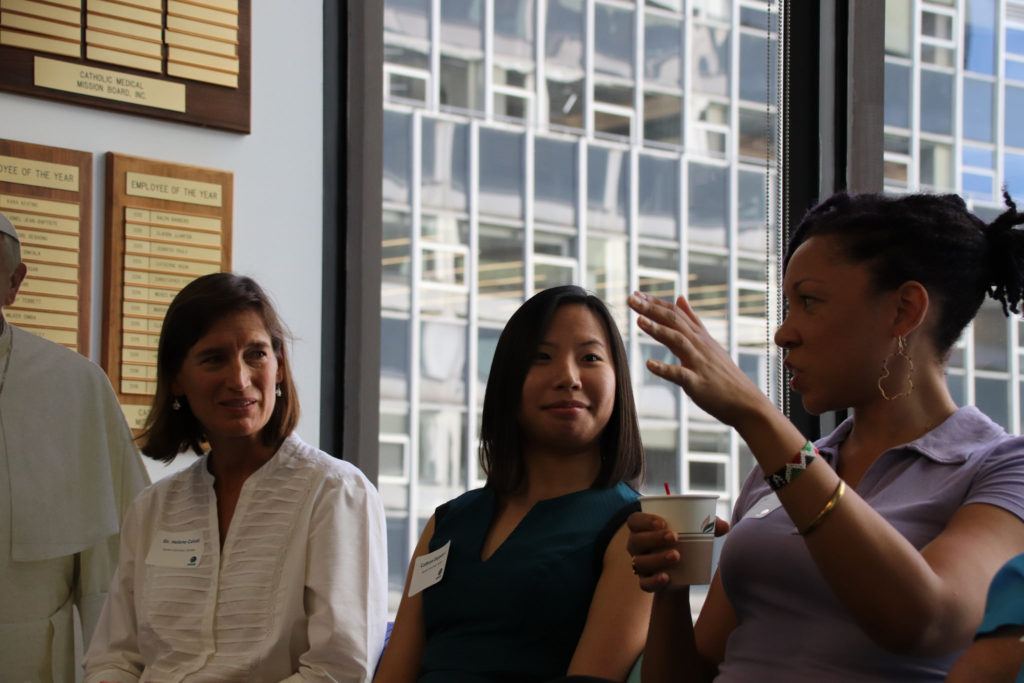Want to Know About Volunteering Abroad?
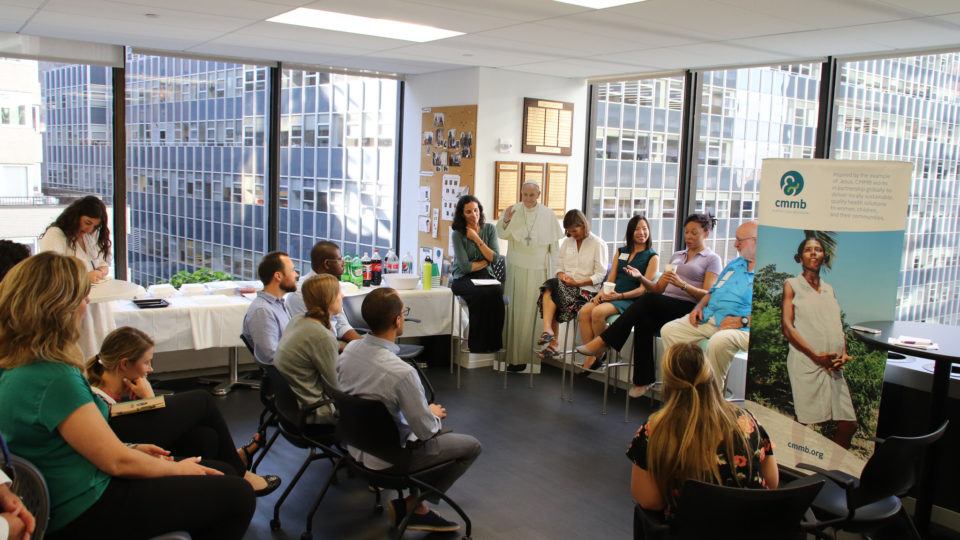
In July, we hosted our newest cohort of international volunteers at the bi-annual volunteer orientation. During the three day event, volunteers participated in a series of sessions and activities (trust us, we kept them busy).
Among these sessions was an amazing alumni volunteer panel discussion. The panel featured four of our former international volunteers who shared their stories and learnings from their own experiences serving abroad. The panel was moderated by Laura Manni – our senior manager of community engagement and communications.
Meet the Panel
Dr. Helene Calvet
Dr. Helene Calvet, as she describes herself, is a part-time, long term volunteer with CMMB. She is board certified in internal medicine and infectious diseases and has participated on a few short-term mission trips to Zambia. At the end of July she completed a 101 mile cycle (we still can’t stop talking about it) as a fundraiser for CMMB programs in Zambia and South Sudan. She has been a participant and guest speaker at several of our volunteer orientations.
Cathryn Espadero
Cathryn is a monitory and evaluations (M&E) specialist. She started volunteering at the New York office in March of last year, and in July, transferred to the Kenya office where she supported M&E functions in the field for eight months.
Dr. Mary Fleming
Dr. Mary Fleming, an OBGYN, served in Mutomo, Kenya with Cathryn (introduced above) for eight months. She returned back to the states this past March.
Dr. Harry Owens Jr.
Dr. Harry Owens is a family medicine doctor and has spent most of his career in under-resourced and developing communities. In November of 2017 to February of 2018, Dr. Harry volunteered for CMMB in South Sudan. This placement, however, was his second time working in South Sudan.
Laura Manni (moderator)
Laura Manni has been working at CMMB for about two years, and before that she was a teacher for most of her life. She spent seven years in Zambia where she helped to set up a school. Her passion lies with “spending time with anyone who spends their life serving others in some capacity.” She was proud to be a part of this panel discussion, to moderate this conversation, to eventually meet all the volunteers, learn their stories, and to get to know this cohort of volunteers.
Highlights from the panel!
We’ll get started with the questions. I’m going to start with Doctor Harry because he is a lifelong volunteer. So, what drew you to volunteering and what keeps bringing you back to it?
Harry: The whole idea of healing spirit, mind, body, and balance. That’s been my basis for everything before even going to medical school. I’ve learned from my past experiences that a little bit of effort, especially teaching and training, can go a long way.
Cathryn, if you could do it all over again, what do you wish you knew before you went to Kenya?
Cathryn: I think it’s more of setting my expectations of what I can, and can’t do. When I went to Kenya, I hadn’t spoken directly to the program officer, so I wasn’t sure what I would be capable of completing in six months. I think the first month was mostly me listening and finding out what the office’s unique challenges were, and what ways my role could fit into what they were already doing, rather than introducing something totally new and unneeded. I think overall, it is important to set your expectations according to what you can and cannot do, and to be humble and flexible.
How did you come to the understanding of what would be more appropriate expectations in Kenya? What support did you get from the team on the ground?
Cathryn: I think just working closely with them, and not coming in with the expectation to change them, but rather with the humility to acknowledge what they’ve already been doing. Whatever I accomplished, I wanted to make sure that it was in line with what the office actually needed.
Dr. Mary, you’re a self-professed nomad. Can you tell me where you’ve been and practiced, and what keeps you moving?
Mary: I started right after residency. First, I went to Boston and did a fellowship in policy, got my MPH and from there, I went into a regular community-based research hospital for four years. But, I wanted to travel more, figure out how to use my MPH, and work on health equity. I found CMMB and liked that it was centered around maternal and child health, that it had well established infrastructure, and that I wouldn’t just be dropped off in the middle of nowhere. I wasn’t specifically trying to go to Kenya, but it suited my needs the best.
Helene, we call you a clinical mentor. Can you tell me, since you’ve been to Mwandi twice, why it is important for that relationship to build?
Helene: I think when you go to a place like Mwandi, something just kind of gets under your skin. Once you see a need somewhere, you’ve got to do something about it. You hear a lot of horrible things in the newspapers, but when you see something personally, you just have to do something about it. You just want to go back and help, and do whatever you can. I would love to go to Mwandi and spend six months there, but I just can’t do that. But there are other things that can still be done. For example, I met the new doctor in Mwandi last time and we’ve been communicating on WhatsApp. So I told her that if she had a difficult question, to contact me. I’ve been trying to arrange specific training each trip to build capacity over time and to build a relationship. It’s something that’s going to take time; it’s not going to happen in one visit. You have to show the people you serve that you’re committed and interested, to walk along with them on their journey.
Can anyone think of one story that you have told people that encompasses your experience since you came back?
Harry: I don’t know the ending of this story yet. I’ll preface it by saying, when you try to plant a date seed to grow a date tree, that tree takes about eighty years before it will produce dates. So, you have to have faith when you plant a date tree that long after you’re gone, the date tree will sprout and have dates. Nasandra was 13 years old and came in with fever and pain in the neck, very typical symptoms of malaria. She had been taking malaria medicine but had not gotten better. We found out she actually had meningitis. Three weeks later, she was finally getting better. I remember talking to her and her parents, encouraging her to consider coming back when she gets older as a nurse to help the children in the hospital. Now, I don’t know if this date tree will produce dates, but one way or the other, I know she and her parents were impressed by her treatment. I think that her parents will try to get her educated, or at the very least encourage her to work in the hospital.
Mary: So I have a clinical story and a non-clinical story. The biggest challenge for me clinically, was taking care of the babies as part of my clinical responsibility. Resuscitating babies to give them a couple hours to live was an emotional conflict that I still haven’t resolved yet. The non-clinical story is cultural. In the U.S. my identity is a few different things, but in Kenya I was very clearly American. I was often told, “you’re not like the other Americans.” I think that there is this perception that Americans are very brazen and come over just trying to take over things. I think it is important to remember how you are perceived and fit in wherever you can – do your work, and then go home. You can’t change the world in two weeks, but you can build a relationship over time.
Cathryn: Well, there is one story that I find myself telling a lot because I think it still haunts me. This is from the non-clinical perspective. I remember one conversation I had late at night in Mutomo when a colleague and I were still working. I told them I thought we were setting too high of targets in regards to the limited staff we had (how many people we were trying to reach, how many people would have access to care). My colleague, although he agreed, told me how he is always thinking of that one pregnant woman or that one child he could have reached if he worked harder. I think that haunts me because it makes me question what I am willing to give up for that one person, because he is right. So I think when we go to our volunteer stations, and we have the opportunity to dedicate a lot of our time it’s a good time to reflect on what we are willing to give. I am still wondering how far am I willing to go the extra mile and that’s different for each person.
Helene: When I went to Mwandi for the second time, there was this young woman who was 22 years old and pregnant, and it turns out she had HIV. She also had a two year old baby. So the next day I was in the HIV clinic, and there was the two year old baby with the dad. The two year old baby was positive and the dad was negative. I was sitting there thinking, that this was a prevention opportunity that was missed. In Mwandi, about 25% of the women who deliver in hospitals are HIV positive. You can do a lot more for the population with prevention work. I just love that CMMB is really doing public health and really focusing on prevention. I look at that family, knowing that the mom is not going to be around long, but also that the child may, with good care, live a long life, and perhaps we can still prevent transmission to the pregnancy the mom has now.
What gift did you leave you volunteer experiences with?
Mary: I think the relationship building on a personal level was really a gift. You’re out there far away from home and you spend a lot of time with the people you work with – you bond with them. I think the friendships I made at the hospital are lifelong relationships that are important. They change you.
Helene: Just letting them know that someone cares, that there is someone who is willing to travel halfway around the world to just go on rounds with them and who is in it for the long haul is important. We’re so used to, in the United States having someone to bounce ideas off and they don’t have that there, so just having that opportunity is valuable.
Cathryn: Mary took me to follow her in the hospital for the day, and I remember these two babies who were premature. They were trying really hard to breathe, and I remember looking at them and thinking, “I hope you know you are coming into this world loved.” I didn’t even know if they were going to make it, but that whole hospital was built on love, and all of the people in that hospital were providing acts of love. You don’t have to be a doctor, but everyone has a part to play. Even if you aren’t saving lives immediately, everyone is working to save lives.
I think it is important to remember that you become part of people’s lives when you volunteer. So now, one of the most difficult things: coming back. What was your experience coming back, what was difficult? What was good?
Harry: I think coming home is much more difficult than first arriving for your term of service. But, the more that you have experiences of going places and coming back, you learn how to build in mechanisms that allow you to adjust, but still hold the experience in your heart.
Mary: Going to the grocery store, you see all the stuff, and you think there are people all over the world who don’t eat. So, every time I go to the grocery store, it’s difficult. But I think for me, it’s finding what my purpose is and what my role is to make the world a little bit better.
Cathryn: I was really sad when I came back because I had these expectations, and when I felt that I didn’t meet them, I was really hard on myself. I came back just in time for my sister’s birthday party, and it was difficult to watch everyone buy all these drinks and all this food. I kept thinking, how here no one had to worry about where their water or next meal would come from, and if something were to go wrong there is a medical facility right nearby. And, I just felt so happy for them that they had that, because this would be a dream for people back in Kenya. I definitely want to keep going back, but I need to consider what my limits are. I think my time in New York has given me the opportunity to build myself spiritually so that I am ready and energized when I go back.
Helene: The first time I worked overseas, was in Guatemala, and I definitely had reverse culture shock. I came back, and went to dinner with a couple of friends, and that dinner could have supported a Guatemalan family for six months. But, I think I came out of it a much more grateful person. Even to this day, 25 years later, when I turn on the shower and hot water comes out, I’m amazed. I’m just so grateful for all this stuff. It was hard to come back from Mwandi, but it is a long term relationship, and I will definitely be back. It is a different type of poverty, and now I’m even more thankful for everything I have.
To wrap things up, if you only had one or two words to sum up your experience in the field as a volunteer, what would they be?
Helene: Love and patience.
Harry: Thanksgiving. I’m very thankful for my experience.
Cathryn: Patience and humility.
Mary: Friendship.
